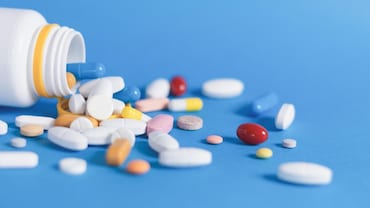- HOME
- /
- Health & Wellness
- /
- Health
- /
10 Ways to Make Your Vitamins Work Better
You take supplements to boost your overall health. Here's how to get the most out of every pill

1. TAKE THEM WITH FOOD
"Eating initiates a cascade of digestive processes that help absorb nutrients from food, and this will also optimize the absorption of the vitamins and minerals," explains Douglas MacKay, senior vice at the Council for Responsible Nutrition, USA. Taking supplements on a full stomach helps prevent nausea, a common side effect. Of course, there are exceptions. Iron should be taken on an empty stomach for better absorption.
2. LEARN HOW THEY WORK WITH YOUR MEDS
Vitamins and minerals can interact with prescription and over-the-counter medications. "For example, vitamin B6 (pyridoxine) must not be taken by people consuming levodopa for Parkinson's. Similarly, vitamin D interacts with many agents including the anti-epileptic agent, phenytoin and anti-TB medicine, rifampicin. And calcium interacts with tetracycline (antibiotic), atenolol (beta-blocker) and levothyroxine," says Dr Chandra Mohan Gulhati, editor of the journal Monthly Index of Medical Specialties (MIMS).
Also, calcium and levothyroxine, a thyroid medication, "compete for absorption in the bloodstream and should be taken a few hours apart", MacKay says. On the other hand, supplements sometimes help drugs work better. Studies show that anti-depressants are more effective when taken with Omega-3-rich fish oil. The worst-case scenario: when supplements excessively amplify a medication's effects. For instance, fish oil and vitamin E are natural blood thinners, so if you take any of them together with an anticoagulant, your blood may become too thin, raising the risk for internal bleeding and haemorrhagic stroke. Ask your doctor for guidance before starting on any supplements.
3. TAKE THEM WITH FAT
Fat-soluble vitamins -- namely A, D, E and K -- are better absorbed when taken with fat. One study in the Journal of the Academy of Nutrition and Dietetics found that adults who took vitamin D with a high-fat breakfast had 32 per cent greater absorption of the vitamin than those who ate a fat-free morning meal. Ishi Khosla, Delhi-based clinical nutritionist, suggests a breakfast containing eggs, nuts and dairy for healthy fats. But fat-soluble vitamins can accumulate in the body and it is possible to get too much of them. So, always get your doctor's OK before taking any extra A, D, E or K supplements.
4. PAIR THEM
Some vitamins and minerals work especially well together, says Chris D'Adamo, PhD, director of research at the Center for Integrative Medicine, USA. Vitamins D and K2 help calcium absorption. Vitamin C helps in better absorption of iron, as D'Adamo notes, "In a study we did, taking iron with vitamin C reduced side effects such as constipation and nausea."
5. BUT KEEP THESE APART
"Large doses (60 mg or more) of zinc and copper compete with one another, as do iron and zinc," D'Adamo says. Calcium also inhibits iron absorption. Take iron in the morning before eating and calcium in the evening, when it can calm your mood.
6. LOOK INTO DIGESTIVE ENZYMES OR PROBIOTICS
Probiotics, which are live bacteria and yeasts that aid digestion, can help nutrients assimilate better, D'Adamo says. So can digestive enzymes. "Plant-based digestive enzymes tend to survive stomach acid," he says, "so they can help with absorption of certain nutrients that may normally get destroyed by the acid."
7. KNOW HOW AND WHERE TO STORE YOUR STASH
"I've found that the best-quality probiotics are shipped and stored cold in the refrigerator," D'Adamo says. Otherwise, the live cultures they contain will be dead on arrival. Omega-3 fatty-fish oil, another popular supplement, should be kept in a cool, dark spot.
8. GO NATURAL
While studies of vitamin E have had mixed results, it is a powerful antioxidant. If you choose to take a supplement, look for natural forms, which are twice as bioavailable as synthetic ones, D'Adamo says. This means your body can use more of the good stuff. Khosla suggests a holistic approach to food to get vitamins and minerals naturally; consuming fresh vegetables, nuts, seeds in their raw form for better absorption. "At times malabsorption can cause a deficiency despite a healthy diet, so addressing underlying reasons like food sensitivities or poor gut health is essential," adds Khosla.
9. WATCH THE CAFFEINE
Caffeine in your morning cup of coffee may interfere with the absorption of vitamins and minerals and may also leach calcium from your bones. Minimize these risks by consuming no more than three cups a day, and wait about 15 minutes after your cup of coffee to take your vitamins.
10. SCHEDULE THEM
Some supplements should be reserved for evenings, as they can make you drowsy. "Magnesium has a true calming effect, and in some cases, it can make people feel downright sleepy, so it is best taken just before bed," says Michael J. Breus, clinical psychologist and author of The Power of When.






